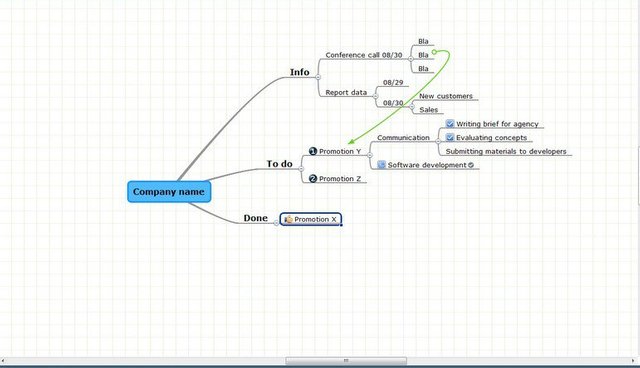
If I could pick just one habit that significantly boosted my ability to manage complex projects over the last year, mind mapping would be my choice.
In this post I explain briefly what a mind map is, whats the proper way of using them and what to look for when choosing a mind mapping tool, with specific advice about software selection.
What is a mind map?
A mind map is a diagram used to organize all the information related to a key item, that you could think about as the topic of the map.
Everything requiring a comprehensive view of a great number of ideas or tasks is an ideal candidate to be the key node of a mind map: a book, one`s life in every aspect, a marketing project, a new business, you name it.
Mind maps dont solve problems actually, but they let you see the big picture and highlight priorities.
The risk, when dealing with an intricated puzzle of activities, people and deadlines, is wasting time on unimportant tasks. If you don`t like (or if you can`t afford) losing control over your projects, keep reading.

Designing mind maps that work
You should always remember why you are designing a map, which is to better understand and manage something.
My suggestion is to limit the number of first level nodes (those directly linked with the subject) and make a wise use of hierarchy, placing the details under high level nodes.
I keep a mind map for each of our Customers (we work for companies, providing loyalty & direct marketing systems), in order to perform daily check-ups and updates. In every map, I put the Customer as the root-node (the topic) and I just add three first level nodes:
1) To do
2) Done
3) Info
Every detail is placed under those three main nodes and their sub-nodes (look at the above pictures, to get an example of what Im talking about).
In any given moment, I can tell you regarding each Customer what has yet to be done, what has already been done and any relevant info.

In addiction, I also use mind maps:
1) as a brainstorming tool: adding, moving, removing, connecting, playing with nodes
2) to build surveys: designing mutiple choice questions, including if answer then question dynamics
3) to support prospecting calls
4) to organize my life
5) to take notes: usually during meetings and conference calls
6) when I`m working with data models: designing, understanding or just representing data models is easy with mind maps, provided that a relational database is made of tables, fields under each table and connections between tables (root-node, nodes, sub-nodes and links between nodes via sub-nodes).
Things I`d like to do with mind maps, but I havent tested yet:
group brainstorming: sharing and co-editing a mind map with coworkers and/or customers.
Which mind mapping tool?
After having tested different mind mapping tools, I came up with the following conclusions:
1) a basic tool is ok: while sometimes its nice to have some advanced features (some applications let you treat nodes as tasks, assigning them to resources, defining due dates or keeping track of completion percentages), the risk is to increase the time spent on maps maintainance, which youll soon realize is a huge minus, especially when dealing with projects that change often;
2) use a combination of offline and online tools: ideally, stick to the online alternative for your day-to-day work, but backup frequently (once a week should be ok) in a format thats compatible with an offline emergency tool, just in case you run out of a stable Internet connection;
3) explore the possibilities of map sharing: some applications let you share and co-edit mind maps with other users. This could serve well a brainstorming session, but you could use a mind map even just to share in a structured fashion the contents of a meeting with people located in different offices, thus receiving a real time feedback about the discussion and advice for additional topics to discuss.
There are a lot of mind mapping applications available on the Internet and Im sure there is some hidden gem out there I don`t know anything about, but I`m really happy with these two:
1) Mind42: online, free, supports map-sharing and co-editing, exports maps in various file formats including FreeMind, imports maps in various file formats including FreeMind
2) FreeMind: offline, opensource and free, perfect as a backup to Mind42 when you are forced to work offline.
Honorable mention: Goalscape (unfortunately, theres no basic free access) and MindMeister (the basic free access lacks some must-have features like FreeMind export/import, but this application has a more refined look than Mind42 and the nodes connection feature is very useful: if you can afford its annual fee, which at 39 dollars is reasonable, do it).

What do you think?
Would you like to share your personal experience or point of view about mind mapping and mind mapping tools? I`d like to read your opinion.
I tryed to use mindmaps regulary, but finally stoped with having one a year, a general plan:)
Downvoting a post can decrease pending rewards and make it less visible. Common reasons:
Submit
Thank you for your comment and your opinion)
Downvoting a post can decrease pending rewards and make it less visible. Common reasons:
Submit
I really liked the idea of mindmapping... but once it got to the point of functionally applying a mindmapping app I discovered that I tend to be "too scattered" for mindmaps to help me a lot. Or, at least, there was so much "clutter" it was not that helpful... so perhaps mindmapping works best for people who have quite a bit of focus in their world; I seldom have had.
That said, I still think mind mapping is an excellent idea for many people... a way to get a visual representation of your life and its possibilities.
Downvoting a post can decrease pending rewards and make it less visible. Common reasons:
Submit
Thank you for point of view, it will be helpful for many people)
Downvoting a post can decrease pending rewards and make it less visible. Common reasons:
Submit